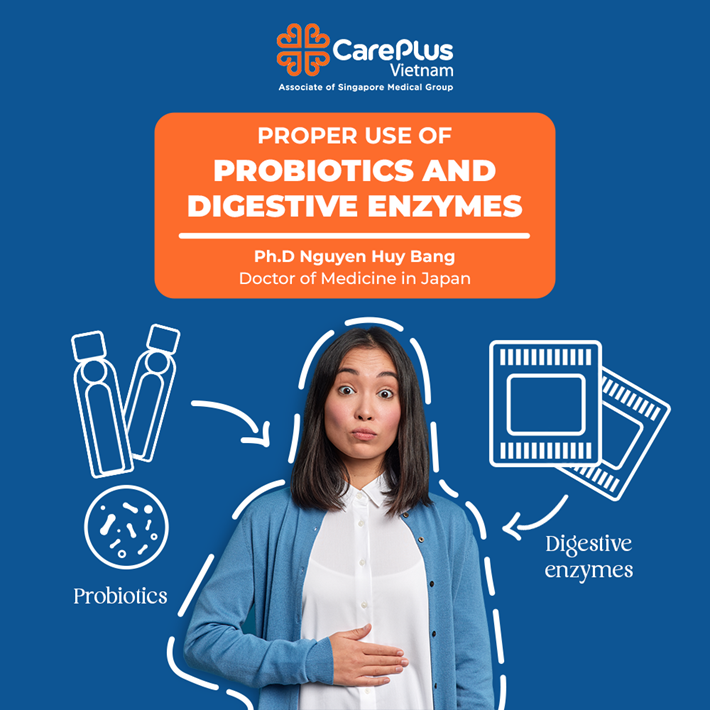Proper use of probiotics and digestive enzymes
Currently, many people mistake probiotics and digestive enzymes for the same type. But these are two completely different preparations and their uses are also different. If you confuse these two enzymes and use them incorrectly, they can have the opposite effect, affecting the digestive system.

2/27/2023 10:30:10 AM
Probiotics - when to use?
In the large intestine, there are always resident bacteria, in addition to pathogenic bacteria, there are also beneficial bacteria (beneficial bacteria). Probiotics help digest food well, create a balanced ecosystem in the intestinal tract and protect the large intestine. These bacteria are involved in the final stages of food digestion.
In addition to helping to ferment food, produce lactic acid, and acidify the intestines, these bacteria also prevent the growth of harmful bacteria, limit digestive infections, overcome intestinal dysbacteriosis, and help prevent bacterial infections. Boosts the immune system in the intestines. As a result, the intestinal tract is healthy to perform well the function of digestion and absorption of food.
Probiotics, also known as probiotics, are beneficial bacteria in the gut. In some cases of digestive disorders, the addition of probiotics, in order to improve the resistance of the intestinal tract, is necessary. Currently, the majority of probiotics on the market are functional foods such as: antibio, bioacimin, probio, and lactomin. However, there are still many probiotic products that contain high levels of beneficial bacteria, so when using, you must follow the instructions for use of the manufacturer or the treating doctor.
For example, in cases of prolonged antibiotic use, when antibiotics cause a side effect that destroys both the beneficial bacteria in the gut and creates an incentive for harmful bacteria to grow, especially helping bacteria to thrive. gas spread, causing intractable abdominal pain, diarrhea, diarrhea... In cases of acute viral diarrhea, it is also recommended to use probiotics.
But if antibiotics are used for a short time or there are no signs of adverse effects in the gastrointestinal tract, probiotics should not be added. Or when the body is normal, the bacteria in the digestive tract is stable, do not add this enzyme. Because when adding probiotics indiscriminately, it will cause an imbalance, which can cause a decrease in natural beneficial bacteria or a sharp increase in some strange bacteria… It can also be the cause or germ of the disease. incurable diseases.
Probiotics are live bacteria and should be taken 30 minutes before a meal. At that time, the stomach is empty, so that these beneficial bacteria can quickly escape from the stomach and into the small intestine to minimize the reduction of beneficial bacteria by gastric acid.
Note when using probiotics
- Do not use probiotics in acute pancreatitis, bowel surgery...
- Take probiotics after antibiotics for about 2 hours, to avoid beneficial bacteria being accidentally killed by antibiotics if the drugs are taken close to each other.
- Do not mix probiotics in boiling water.
- After mixing, drink it right away, don't leave it for too long, causing microorganisms to die.
Digestive enzyme is an enzyme (enzyme) secreted by the body to digest food. Digestive enzymes are indicated when the doctor suspects or has evidence of a deficiency of digestive enzymes or wants to enhance the ability to digest food for a certain period of time.
Digestive enzymes are indicated and should only be used by a doctor's prescription after a digestive examination and diagnosis of digestive enzyme deficiency.
One thing to note is that, many families with young children or the elderly, when they see the phenomenon of poor eating, then arbitrarily add digestive enzymes, which is completely detrimental to the health of the digestive system. Because digestive enzymes are indicated for a certain period of time to enhance digestion. Except for patients with congenital digestive system damage, long-term digestive enzyme supplementation is required. As for the case of acute diseases affecting the digestive system, digestive enzymes should only be used for 1-2 weeks, not for prolonged use.
Arbitrarily supplementing digestive enzymes for a long time will have the opposite effect, reducing the body's natural digestive enzymes secretion and leading to the body having to depend on the source of enzymes from outside. This leads to inhibited digestive glands, decreased secretion of digestive enzymes, and possibly atrophy. Therefore, for children or the elderly with symptoms of anorexia, anorexia, it is necessary to find out the cause to overcome, but not to use digestive enzymes in the form of drugs.
Digestive enzymes are enzymes that make food easier to digest. Therefore, it should be drunk at the time after eating the main meal about 30 minutes with cooled boiled water. When the food has been kneaded, softened and absorbed by the stomach, the addition of digestive enzymes will effectively catalyze the reaction.
In clinical practice, some patients are particularly deficient in both digestive enzymes and probiotics, and doctors may prescribe both. When indicated, patients need to pay attention to the time of taking yeast to achieve the highest effect.
Note, do not use the previous prescription for the next time, even if you have the same gastrointestinal symptoms.